QuestionQUESTION: Hello,
I have a 6 year old stray cat that has a moderate mouth
disorder (gingivitis/stomatitis) and mostly has been doing
well all his life except for when his mouth conditions
worsened.
For last two-three weeks he's been having loose stools, due
to which he's been losing weight really fast. We took him to
the vet who administered him with Amoxicillin for 5 days.
His stool became a bit better and he did start eating for a
while, but as soon as he got off the medicine, his condition
worsened.
The vet also made us force feed him with water and oral
rehydration liquids after every few hours since he has been
losing hydration every now and then.
He hasn't lost his appetite completely but he would only
drink mild chicken soup and chicken jellies. No solid food
whatsoever. We consulted the vet again and he said he will
put him on a medication called Flagyl for a week and see if
he gets any better.
The thing that really troubles me is his weight; he has lost
tremendous amount of weight and his stool hasn't gotten
better in weeks. There is no blood in his stool (at least
not visible to me or my family) and it's somewhat watery and
hard mixed. He often does lose control before defecating and
does some on the floor instead of his litter box. Also, he
tries to urinate every hour, even if it's a few drops. His
urine is of normal color, and we're giving him liquids as
much as we can. 2 days ago we gave him his favourite tuna
food and he vomited it after 1.5 hours, totally undigested.
He hasn't vomited since then. Also, he enjoys a tummy rub
every now and then.
I live in a third world country where there are no specific
testing laboratories for pets and animals hence I can't give
you any information on his blood work.
We have kept him indoor for almost 3 weeks now, without
letting him outside even for a minute.
Regards
ANSWER: Hi Cheryl,
Sorry to hear your kitty is doing so poorly! The Flagyl is a really good idea. It will help control some of the infections that tend to cause the worst gastrointestinal disease, such as giardia, and assorted bacteria. It also has an anti-inflammtory effect. It's encouraging that your cat responded at least partially to the amoxicillin, so hopefully that means that you are dealing with a bacterial infection. If the vet has it available, I might also ask how they feel about adding in some tylosin (commonly called Tylan), which is another antibiotic that treats gastrointestinal germs. This tends to target a broader spectrum of bacteria, whereas the Flagyl helps a lot with protozoan germs. The tylosin will also help dramatically reduce inflammation. I only bring up the tylosin because I feel a little suspicious that you may be dealing with bacteria, since amoxicillin kills bacteria and not protozoa.
Your kitty could be suffering from a condition called Inflammatory Bowel Disease (IBD). Cats with this condition suffer severe inflammation of the gastrointestinal tract. They will have serious, chronic diarrhea, vomiting, or both. The patients will lose weight, and if they go without treatment, they'll die of malnutrition. It's uncertain what causes the condition. It seems that stress and anxiety play a part, and that an allergy or overreaction to bacteria in the intestines and/or food ingredients also play a role. The stomach and/or intestines become lined with inflammatory cells as the immune system begins to attack the body's own tissues, and the cat develops symptoms.
There is no real test for IBD, and the diagnosis is generally made when cats have symptoms that don't respond to treatments such as Flagyl or Tylan, but no other explanation for their symptoms can be found. When no diagnostics are available to rule out other illnesses, a trial period of the treatment will generally serve - if they respond, it's typically assumed the cat has IBD.
Cats with this condition can often benefit from antibiotics to reduce "bad" bacteria in the gut, and a probiotic to raise "good" bacteria in the gut. Also, a special diet with limited food ingredients can help some of them, if this is available (talk to your vet). Finally, most cats require an anti-inflammatory to calm down their gastrointestinal tract. The most successful one is prednisone. It's typically given once or twice a day to start, then tapered down to the lowest effective dose - usually a few times a week.
I hope he's feeling better soon!
Jessica
---------- FOLLOW-UP ----------
QUESTION: Jessica, THANK YOU SO MUCH for replying me back with such a
detailed answer.We are doing everything to give him enough
electrolytes and nutrition every day. Unfortunately, Tylan
is not available here right now, so Flagyl will be
continued.
From today, he'll be administered with Prednisone and pro-
biotics too. The vet asked us to change his food to
something easier to digest and a lot more nutritious.
Even though it's been two days only, I've not noticed any
changes in our cat's diet, ever since he's been on Flagyl.
He hasn't lost his appetite, and tends to feel hungry when
we're cooking or warming food in the kitchen, but he's very
reluctant to eat anything solid. His stool however does look
more "pudding-like" and still very loose. Is that normal?
The vet thinks it may take some time, but his diarrhea has
been there for weeks now.
I guess I'm just desperate to see him recover and eat
normally so he can gain his weight back :) Thanks again for
your time, I really appreciate it!
AnswerIt will take several days for these medications to start making a very noticeable difference. Stools should start becoming noticeably firmer in response to Flagyl within about 4-5 days. But if IBD is present, it can take about a week, sometimes longer, before you'll notice any benefit from the prednisone. Cats will usually gain back an appetite with the prednisone even before their diarrhea and vomiting is controlled, often within a couple days of commencing treatment.
A pudding-like consistency doesn't sound like you're doing too bad to me as far as the diarrhea goes - hopefully that continues to firm up. The consistency of the stool should get slowly more solid over the course of several days.
His appetite is definitely worrisome, though, and I hope that will return as the prednisone reduces some inflammation, and the Flagyl controls any infectious aspect of his condition. Remember that when he does begin eating solid foods again, he should just eat a tiny portion at a time at first, even if he appears eager to eat more. If he eats too much, his stomach may become overwhelmed, and he's likely to vomit. Feed him another portion after an hour or two.
It's very difficult to sit by and watch these patients suffer, but unfortunately, these are the best treatments we have for them! Thankfully, most cats respond very well.

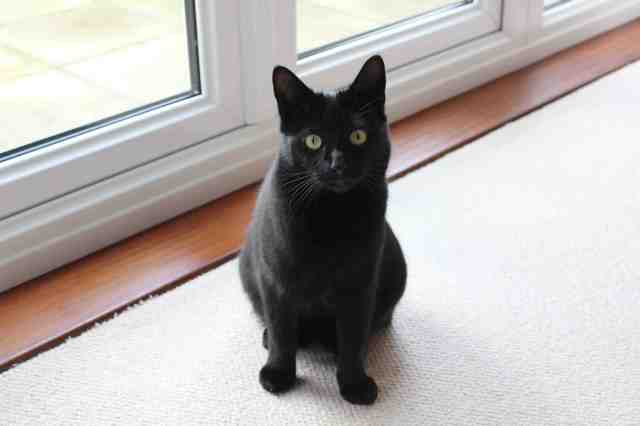 My cats gone missing
Question
Tommy
Hi Jessica,
I do hope that you c
My cats gone missing
Question
Tommy
Hi Jessica,
I do hope that you c
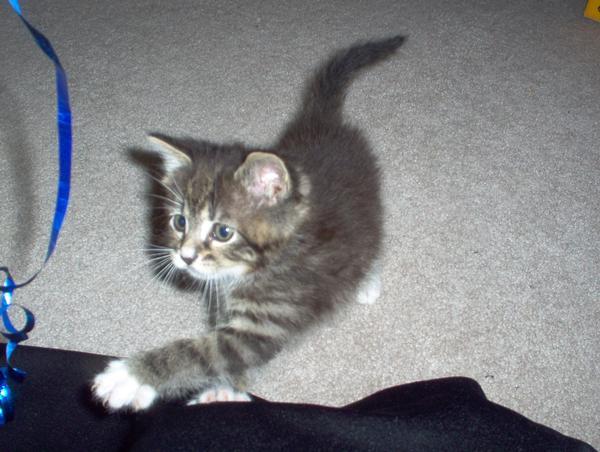 runts
Question
stubby(my cat)
Can the mother chew off
runts
Question
stubby(my cat)
Can the mother chew off
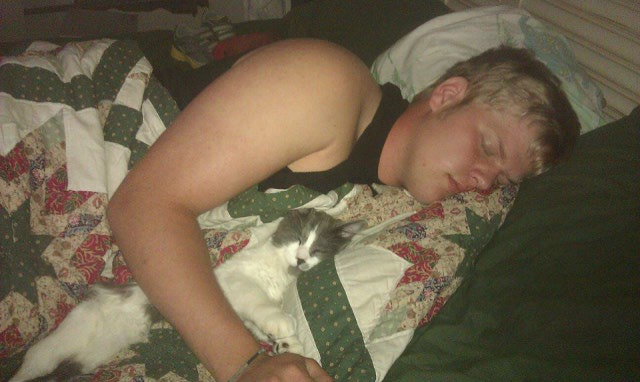 Sick kitty
Question
Kelso
Hi, I rescued a feral cat who was
Sick kitty
Question
Kelso
Hi, I rescued a feral cat who was
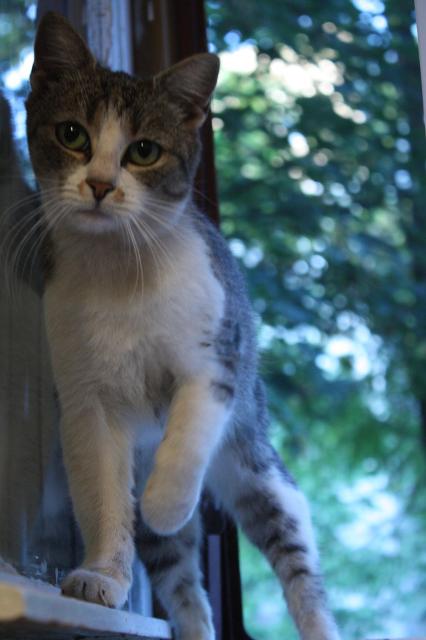 Cat meaowing after spayed
QuestionQUESTION: Hello, I am having a problem with my
Cat meaowing after spayed
QuestionQUESTION: Hello, I am having a problem with my
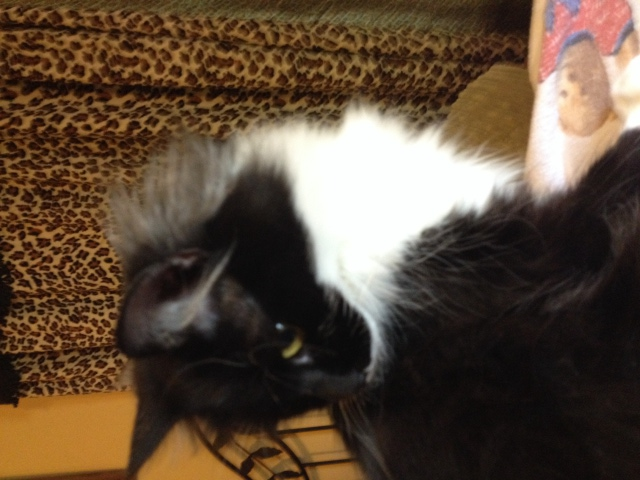 Breed of cat question
Question
Funny Face Funny Face photo2
Hi.
Breed of cat question
Question
Funny Face Funny Face photo2
Hi.